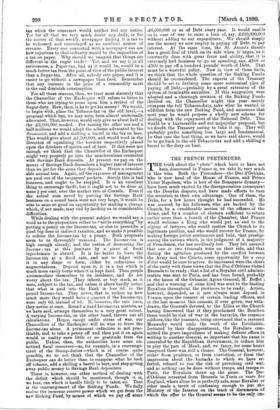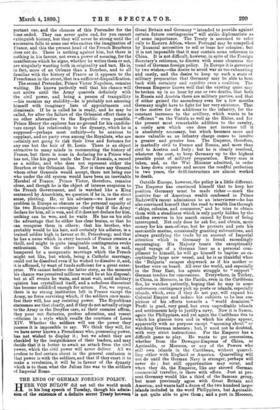THE FRENCH PRETENDERS. T HE truth about the "plots" which have
or have not been discovered in France is, we take it, very much in this wise. Both the Pretenders—the Due d'Orleans, who is now head of the House of France, and Prince Victor Napoleon, who is heir of the Bonaparte dynasty— have been much excited by the disorganisation consequent on the Dreyfus dispute, and have made efforts to turn the situation to their own advantage. One of them, the Duke, for a few hours thought he had succeeded. He was assured by his followers, who are backed by the Church, by a considerable section of the officers of the Army, and by a number of electors sufficient to return rather more than a fourth of the Chamber, that France would welcome a King who would put an end to the regime of lawyers, who would restore the Church to its legitimate position, and who would recover for France, by making foreign policy continuous and bold, that prestige among the nations which, in the judgment of a majority of Frenchmen, she has needlessly lost. They felt assured that one or two Generals were on their side, and that during the agitation produced by the conflict between the Army and the Courts, some opportunity for a coup d'etat would be sure to arrive. So impressed were the chiefs of the party with these views that the Due d'Orleans visited Brussels to be ready ; that a list of a Royalist civil adminis- tration was sent to Paris, and has been found, probably in the house of the Orleanist Agent-General, M. Buffet ; and that a warning of some kind was sent to the leading Royalists throughout the provinces to be ready. Action, however, depended, as it now always must depend in France, upon the consent of certain leading officers, and at the last moment this consent, if ever given, was with- drawn, the Generals devoted to the Lilies or the Church having discovered that if they proclaimed the Bourbon there would be risk of war in the barracks, the common soldiers, like the peasants, being convinced that a restored Monarchy would undo the work of the Revolution. Irritated by their disappointment, the Royalists com- mitted the grave imprudence of making definite offers in writing to another General, so important that his name is concealed by the Republican Government, to induce him to play the part of Monk, and, we fancy, for some hours imagined there was still a chance. The General, however, either from prudence, or from conviction, or from that impression about the barracks to which we have re- ferred, refused to run the risk of provoking civil war, and as nothing can be done without troops, and troops in Paris, the Royalists threw up the game. The Due d'Orleans retreated from Brussels to Turin en. route for England, where alone he is perfectly safe, some Royalist or other made a merit of confessing enough to put the Ministry of the Interior on the track of documents of which the offer to the General seems to be the only in- portant one, and the chances of this Pretender for the time ended. They can never quite end, for you cannot extinguish history, but they will never be strong until the succession falls to some one who excites the imagination of France, and this the present head of the French Bourbons does not do. There is nothing against him, but there is nothing in his favour, not even a power of seeming, for the manifestoes which he signs, whether he writes them or not, are singularly wanting both in originality and tact. He is, in fact, more of an Orleans than a Bourbon, and to all familiar with the history of France as it appears to the Frenchman in the street, that is a sufficient disqualification.
The second Pretender, Prince Victor Napoleon, remains waiting. He knows perfectly well that his chance will not arrive until the Army quarrels definitely with the civil power, and being a person of tranquillity —his enemies say stolidity—he is probably not amusing himself with imaginary lists of appointments and dismissals. If he is called he is ready, and he may be called, for after the failure of the Orleanist effort there is no other alternative to the Republic even possible. Prince Henry the explorer has no ground for his candida- ture except his relationship to the dynasty, which he is supposed—perhaps most unfairly—to be anxious to supplant, and no party even among the Royalists, who are certainly. not going to risk their lives and fortunes for any one but the heir of St. Louis. There is an object attractive to many minds in recementing the history of France, but there is none in declaring for a Prince who has not, like his great uncle the Duc d'Aumale, a record as a soldier, and who does not represent either the Bourbon or the Orleanist line. Nor is there any General whom other Generals would accept, there not being one who under the old system would have been an inevitable Marshal of France. Prince Victor, therefore, remains alone, and though he is the object of intense suspicion to the French Government, and is watched like a. Bing sentenced by Anarchists, we question if he is, in the strict sense, plotting. He, or his advisers—we know of no problem in Europe so obscure as the personal capacity of the two Bonapartes—recognise clearly that if the Army declare for him, all is won, and if it does not declare for him, nothing can be won, and he waits. He has on his side the advantage that he either has clear brains, or that he can recognise them in others; that his brother, who probably would be his heir, and certainly his adlatus, is a trained soldier high in favour at St. Petersburg; and that he has a name which in every barrack of France creates a thrill, and might in quite imaginable contingencies evoke enthusiasm. On the other hand, he is, it is said, hampered by a morganatic marriage which the French might not like, but which, being a Catholic marriage, could not be dissolved even if he wished to dissolve it, and, it is affirmed, by want of funds sufficient for a great enter- prise. We cannot believe the latter story, as the moment his chance was perceived millions would be at his disposal; but at all events he waits, and must wait, until military opinion has crystallised itself, and a nebulous discontent has become solidified enough for action. For, we repeat, there is no strong institution left in France except the Army, no force surviving which, if the soldiers once mani- fest their will, has any resisting power. The Republican statesmen see that clearly, and if they do not actually cringe to the Army in the Dreyfus case, as their enemies affirm, they pour out flatteries, profess adoration, and resent criticism in a style which recalls the courtiers of Louis XIV. Whether the soldiers will use the power they possess it is impossible to say. We think they will, for we have never known a Frenchman who, possessing power, has not wished to display it ; but we admit they are shackled by the insignificance of their leaders, and may decide that it is better to await an attack from the civil power, which the civil power will never deliver All we profess to feel certain about in the general confusion is that power is with the soldiers, and that if they exert it to make a revolution, it will be in favour of the dynasty which is to them what the Julian line was to the soldiers of Imperial Rome.







































 Previous page
Previous page